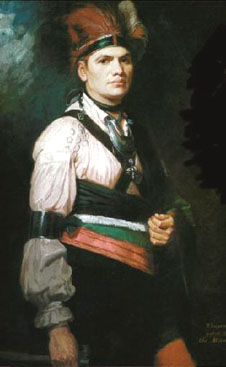| Joseph Brant  AKA Thayendanega AKA Thayendanega
Born: 1742
Birthplace: Ohio River Banks
Died: 24-Nov-1807
Location of death: Brantford, Ontario, Canada
Cause of death: unspecified
Remains: Buried, Her Majestys Chapel of the Mohawks, Brantford, Ontario, Canada
Gender: Male
Religion: Anglican/Episcopalian
Race or Ethnicity: American Aborigine
Sexual orientation: Straight
Occupation: Military Nationality: Canada
Executive summary: Mohawk Indian Chief American Indian chief of the Mohawk tribe, known also by his Indian name, Thayendanegea, was born on the banks of the Ohio river in 1742. In early youth he attracted the attention of Sir William Johnson, who sent him to be educated by Dr. Eleazar Wheelock at Lebanon, Connecticut, in Moor's Indian charity school, in which Dartmouth College had its origin. He took part, on the side of the English, in the French and Indian War, and in 1763 fought with the Iroquois against Pontiac. Subsequently he settled at Canajoharie, or Upper Mohawk Castle (in what is now Montgomery County, New York), where, being a devout churchman, he devoted himself to missionary work, and translated the Prayer Book and St Mark's Gospel into the Mohawk tongue (1787). When Guy Johnson (1740-1788) succeeded his uncle, Sir William, as superintendent of Indian affairs in 1774, Brant became his secretary. At the outbreak of the War of Independence, he remained loyal, was commissioned colonel, and organized and led the Mohawks and other Indians allied to the British against the settlements on the New York frontier. He took part in the Cherry Valley Massacre, in the attack on Minisink and the expedition of General St. Leger which resulted in the battle of Oriskany on the 6th of August 1777. After the war he discouraged the continuance of Indian warfare on the frontier, and aided the commissioners of the United States in securing treaties of peace with the Miamis and other western tribes. Settling in Upper Canada, he again devoted himself to missionary work and in 1786 visited England, where he raised funds with which was erected the first Episcopal church in Upper Canada. His character was a peculiar compound of the traits of an Indian warrior -- with few rivals for daring leadership -- and of a civilized politician and diplomat of the more conservative type. He died on an estate granted him by the British government on the banks of Lake Ontario on the 24th of November 1807. A monument was erected to his memory at Brantford, Ontario, Canada (named in his honor) in 1886.
Father: (d. when Joseph was in infancy)
Mother: Owandah
Sister: Molly (married Sir William Johnson)
Wife: Christine (d., tuberculosis)
Wife: Susannah (d., tuberculosis)
Wife: Catherine Croghan
Son: Isaac (d. 1795, killed by Joseph in self-defense)
High School: Moor's Charity School for Indians, Lebanon, CT
Freemasonry (Apr-1776)
Converted to Anglicanism
Religious Mission
Requires Flash 7+ and Javascript.
Do you know something we don't?
Submit a correction or make a comment about this profile
Copyright ©2019 Soylent Communications
|